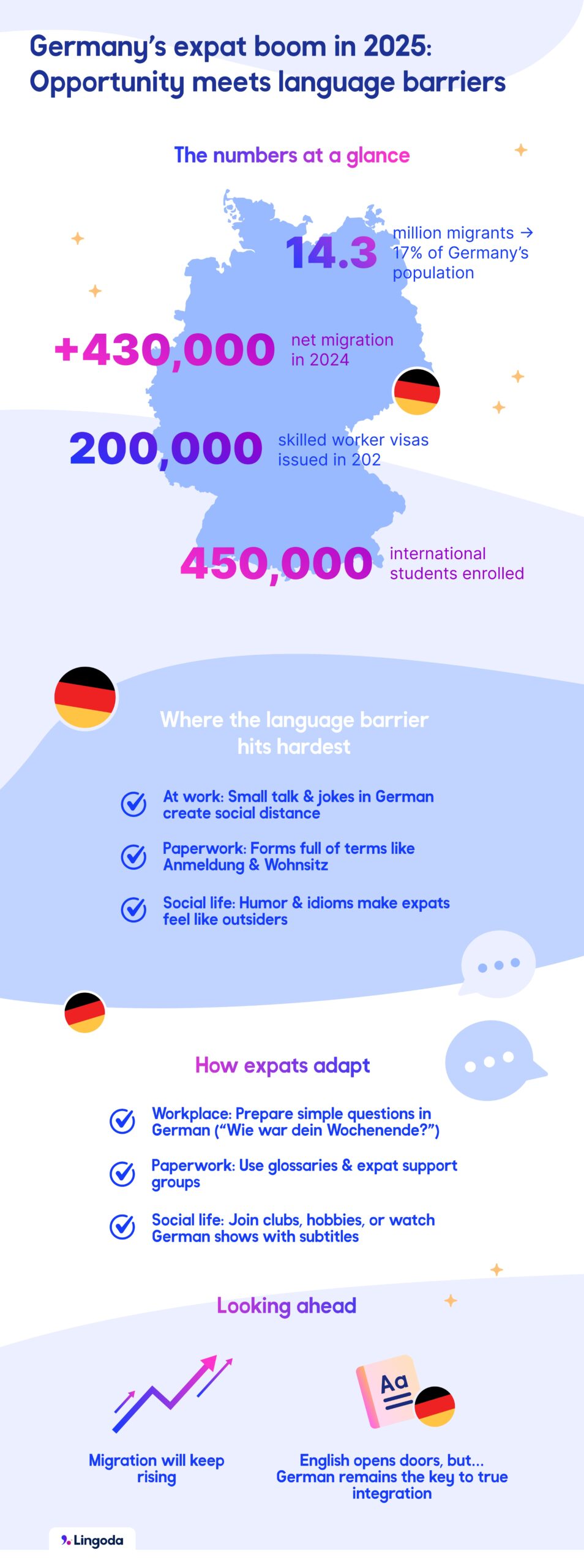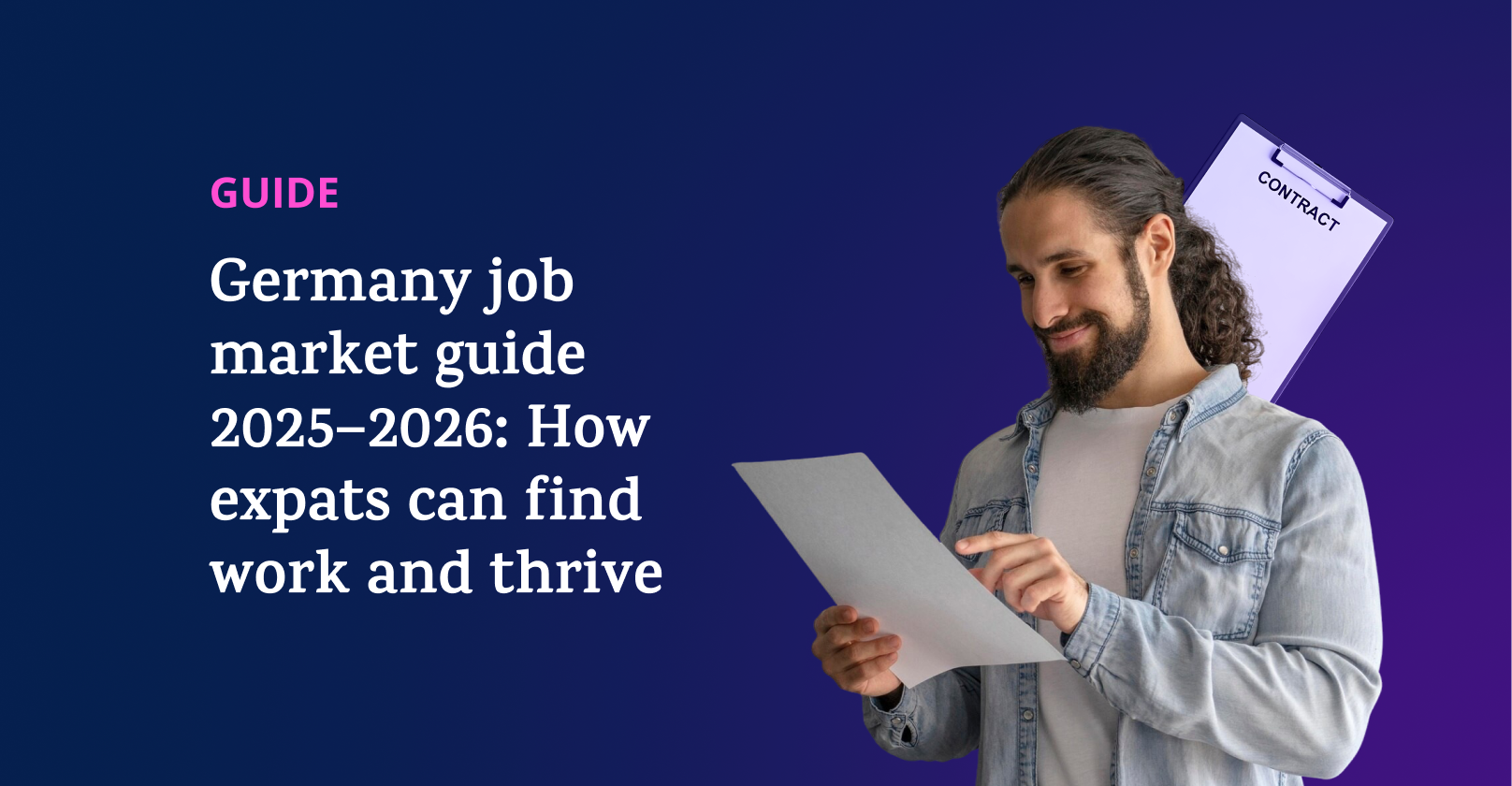Germany’s expat boom: Opportunity meets language barriers
Germany is buzzing with newcomers. From engineers filling job shortages to students chasing affordable degrees, more people than ever are choosing to make the country their home.

The foreign-born population has climbed to 14.3 million — about 17% of all residents — a sharp 7.5% rise in just one year.
But behind the numbers lies a common story: adjusting to daily life in a language that isn’t your own. Buying a tram ticket, signing a rental contract, or sharing a joke at work can suddenly feel like obstacles. The influx is real, the opportunities are big. But so are the language challenges.
- A first morning in Germany
- The numbers behind the expat wave
- Where the language barrier shows up most
- How newcomers adapt
- Looking beyond
A first morning in Germany
Picture this: you’re one of the 430,000 newcomers who arrived in Germany last year. Your first morning is simple on paper:
- Buy a tram ticket
- Register your address
- Grab some groceries
But each step is a mini test. The ticket machine only speaks German. At the supermarket, labels like Angebot des Tages make no sense. At city hall, forms bristle with terms like Anmeldung and Wohnsitz.
Integration doesn’t begin with policy, it begins with words.
The numbers behind the expat wave
Both demand and policy shape Germany’s migration landscape:
- 14.3 million migrants live in Germany (17% of the population).
- +430,000 net migration in 2024 alone.
- 200,000 skilled worker visas issued in 2025.
- 450,000 international students enrolled across German universities.
Driving this rise is the Chancenkarte (opportunity card), launched in 2025 to make entry easier for qualified professionals. Sectors like healthcare and IT are already opening fast-track routes to fill shortages.
But demand is only half the story. According to The Guardian, Germany urgently needs more migrant workers to offset its ageing workforce — yet public debates about integration still shape how welcome newcomers feel. The challenge isn’t just attracting talent; it’s ensuring that expats can thrive once they arrive.
This dual focus, bringing in students and skilled professionals while updating immigration frameworks, is redefining what it means to integrate. The numbers show clear momentum, but the lived experience will depend heavily on how newcomers manage everyday life, particularly with the language barrier.

Where the language barrier shows up most
In the workplace
At international firms, English often bridges gaps. But in many local companies, meetings, memos, and jokes expect German fluency. One newcomer shares on Reddit:
“At my first team lunch, everyone switched to German in seconds—while I tried to follow—and mostly failed.”
This shows how even everyday chats become an emotional hurdle when you're trying to adapt fast.
Bureaucracy and housing
From Anmeldung (address registration) to visa paperwork and rental contracts, official processes are typically German only. Smaller towns often lack English-speaking assistance, making paperwork feel like blunt force trauma to your language skills.
Social integration
Joining local clubs or making casual connections can hinge on humor, idioms, and small talk—all soaked in cultural context. Misunderstanding a joke or an expression can make you feel like an outsider, even in friendly groups.
How newcomers adapt
Here are real-life challenges expats face and how they practically address them:
1. Feeling excluded at work
- Challenge: Casual conversations in German leave you feeling out of the loop.
- Solution: Prepare a few questions or comments in advance (“Wie war dein Wochenende?”), and gradually join small talk. Listening first, then responding in German helps build confidence.
2. Paperwork frustration
- Challenge: Forms full of German terms like “Daueraufenthaltserlaubnis” are intimidating.
- Solution: Build a mini-glossary, ask for translations from others who've gone through it, or join a local registration support group.
3. Limited English services in small towns
- Challenge: Without access to English, everyday errands become stressful.
- Solution: Learn key phrases like “Wie komme ich zum Rathaus?” Then practice with locals or language meet-ups. Even basic German opens doors quickly.
4. Making friends beyond expat circles
- Challenge: Your social life stays isolated in English-speaking bubbles.
- Solution: Join a local interest group like yoga, cooking, hiking. Shared activities cultivate natural interaction, and people welcome the effort.
5. Not understanding social cues and unspoken rules
- Challenge: You don’t always get what’s "normal": like queueing habits or polite register.
- Solution: Observe how people speak at the bakery. Mirror that tone. Ask open questions when unsure, as most locals appreciate the effort to learn.
6. Humor and idioms slip away
- Challenge: Jokes and cultural references fly over your head.
- Solution: Watch German comedies or talk shows with subtitles. They clue you into everyday phrases, help you get jokes faster and laugh along.
Looking beyond
Migration to Germany will keep climbing. With 200,000 skilled worker visas and 450,000 international students in 2025, the trend is set. An ageing workforce means the country needs newcomers to stay competitive.
Language will remain the dividing line: English at global companies, German in daily life and bureaucracy. The future looks bilingual, with English opening doors, German anchoring true integration.
We use AI tools to support idea generation and drafting. Every article is edited by our editorial team to ensure accuracy, clarity, and quality.













